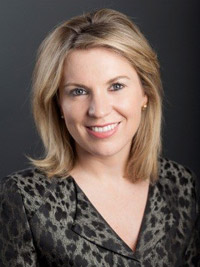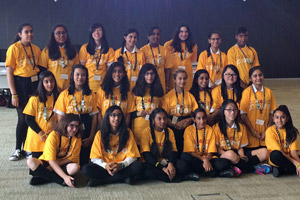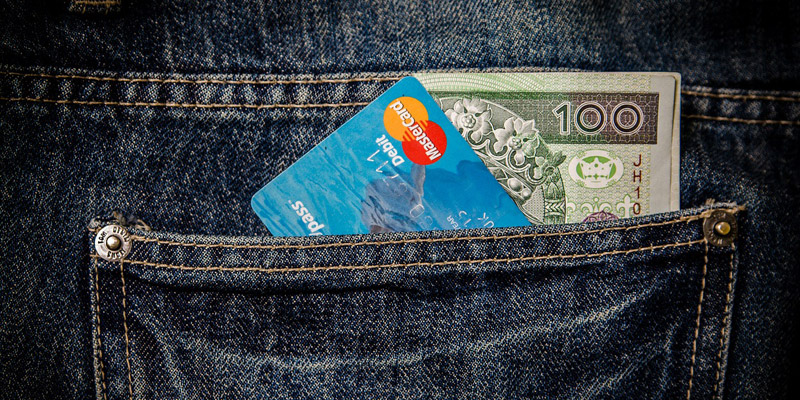Eimear Creaven is Senior Vice President at MasterCard UK & Ireland. Having joined the company in 2012 as Chief of Staff to Ann Cairns, President of International Markets, she now holds a seat on the UK & Ireland board, oversees MasterCard’s Irish operations, and manages a large portfolio of clients from card-issuing banks to small businesses. Eimear is a prominent figure in the company’s Women’s Leadership Network, and a staunch advocate for its talent programmes such as Girls4Tech, which has encouraged 3,000 schoolgirls around the world to take on STEM subjects.

“…With senior executives they know if you’re not being yourself and not being authentic, so I benefited from that confidence to put my own self forward and I think it’s helpful if you want to progress through your career…”
Launching my career: From Dublin to New York
In case the name hasn’t already given me away, I’m from Ireland. I studied Bachelor of Commerce at university there. I completed my degree and travelled for a year and a half. I spent some time in Australia, New Zealand and the U.S. before I came back 18 months later much wiser and with a great perspective on some of the things that were going on around the world.
I was looking at how I was going to launch my career and I looked at the Irish banks because they have wonderful graduate training programmes. I started with Allied Irish Bank (AIB) in Dublin. One of their senior women was instrumental in helping me to move to their office in New York. I moved there in 2002 and I worked with AIB for the next five years. It was a fantastic time to be working in finance in that city, before the bubble of 2008.
Choosing to study for an MBA in Paris
It was a great learning experience. When I was close to completing my time in New York I started to think about what next. As part of my travels we stopped off in Berkley en-route to Australia. I stayed with a friend who was studying for his MBA there and I loved the idea of it. I thought it was a great opportunity to take some time out after I’d worked for a few years and go back to study and so I looked at doing it.
I wanted to get back to Europe, so I applied to INSEAD, which is in a beautiful location in a forest just outside Paris. I was very fortunate to be accepted on their programme, so I started with them in 2008.
The world had taken quite a curve
When I came out of INSEAD, the world had taken quite a curve because of the recession. I joined a consulting firm called Alvarez & Marsal. I loved their style. They support companies going through challenging periods. So I submitted my CV and I was accepted to go and join their financial institutions team in London – they had one of the mandates to work on Lehman Brothers [after its bankruptcy], which meant that I spent my first year working on that. I spent my next year in Reykjavik in Iceland working on the banking crisis.
I spent the next few years at Alvarez travelling around Europe fighting fires, moving to Greece and then back to Ireland. It was fascinating spending time in different economies with different pressures.
Moving to MasterCard – a global brand with a huge technology focus
One of the things I was hugely grateful for was that my senior partner in Alvarez was Ann Cairns. She moved across to MasterCard and she was part of the reason that I moved too. There was a lot about working with MasterCard that was so growth focused. It was a global brand and had a huge technology focus, and that resonated with me.
I’ve been working with MasterCard now since 2012 in a couple of different roles. My role is now about the UK & Ireland, and it’s such a great market to be in – I now manage a team that looks after all the challenger banks in this market – a huge agenda both from the Government’s perspective and from the consumer’s perspective. They’re always looking at new technologies and ways of working which is great.
I also oversee our business in Ireland, and in addition I manage our prepaid cards from a product perspective.
Prepaid cards are great for travelling and also great for people who for whatever reason don’t have bank accounts. They can act as a bank account-light solution for teenagers, for example. There’s a control functionality in there that gives parents a lot of comfort and control so they’re able to close e-commerce channels if they don’t want their children to be able to make certain purchases, for example. They are fantastic for the financially excluded – if you don’t have a bank account, imagine how difficult it is to pay a bill or buy something online. There are a lot of different uses around prepaid and we’re supporting all of them.
Leveraging technology
We also look at the new banks that are thinking about new ways to enter this market and they are leveraging technology through things like having digital solutions for the younger, Gen X and Gen Y consumers.
They’re bringing new ideas to the table and that’s only a good thing for consumers. For me, that approach makes it a more dynamic, interesting and varied place to work. Four months in and it’s definitely very new, but I’m enjoying it so much.
A seminal moment in payments – “Every device is a payment device.”
I think we’re at a seminal moment in payments right now because of the change that we’re going to see happen over the next five years will be greater than we’ve seen over the past five decades. A lot of that is centred around contactless and how consumers are engaging with their contactless card, and more importantly, with their mobile, which is all based around that contactless technology.
We have a saying here that, “Every device will become a payment device.” So you have a mobile phone, an iPad, even your TV now is an opportunity for you to transact. So that’s just a fantastic opportunity for us and our partners.
Furthering the consumer experience
For us it’s about furthering the consumer experience and technology is at the core of what is driving the Apple Pays and the Samsung Pays because it’s just another way for consumers to transact – a new channel for them to think about.
It’s always been fascinating in London – contactless has been around for over ten years. It’s not ‘new-fangled’ technology that’s happened over night, but it does require that tipping point that for everybody to get comfortable with it and for consumers to have confidence in it, and believe in the safety and security aspects of it.
With Transport for London [TfL] in particular where people were migrating from their Oyster Card to their contactless card, they were much more comfortable with the payment flows were happening and the speed at which they were happening, and how much easier this was making their day to day life.
That’s wonderful because now with mobile we’re seeing the tech companies are choosing contactless as the platform for them to develop their solutions of the future. That’s where I see our business shaping and shifting in the coming years. Everybody is thinking through how they have the right infrastructure to support this and consumers are getting more comfortable with it, so it’s all coming together.
All eyes on the UK
The UK was the second place for Apple to launch, so it’s all eyes on us! We have a very strong contactless infrastructure, so we are ready to roll out the mobile payment schemes here, we’ll be driving those changes over the next 12-24 months. It’s an exciting time for us and for our partners.
Smart cities are a great example of the way technology will be used in the future. In ten years’ time a huge percentage of the population will be living in the global, urban centres. It’s going to be incredible to get a sense of how people will be able to conduct their day to day lives. We’re thinking about that infrastructure right now and taking the learnings that we’ve seen from the TfLs of the world and sharing them across the other big cities is part of what MasterCard does so well because we have that global footprint and we have those relationships.
We know the key players in those cities – not just the banks, but the retailers as well and the governments and the people who are driving this agenda, so we’re in a prime position to support those conversations.
Thinking about the impact women can have on companies
I’m from an Irish family. My mother is one of twelve; my father is one of thirteen, and we had some very strong women in our household.
When I lived in New York I was in my twenties. I was really enjoying life and was building the basis of my career. I wasn’t thinking too much about the gender question, or how women behave in business. I moved to Iceland and spent a year working in a culture where it’s very gender balanced and women are a huge percentage of the working population. It was only then that I stared to think about the impact women can have on companies.
It was a little after the crash and we worked with a fund there, which had a wonderful saying which was, “If it had been Lehman Sisters, would we be in the place that we are today?” That was a time when people were starting to think about the female agenda and so I started to become more aware of it.
Putting the right policies and procedures in place to support women’s careers
London, New York and Dublin are incredible cities. They are very high energy. There’s a strong work ethic and it can be challenging at times. I think it’s an incredibly positive step that companies are putting the right policies and procedures in place to ensure that they support women as they go through their careers, to ensure they are able to retain that knowledge and bring them back centre stage once they’ve returned from maternity or career breaks. You’re starting to see them reap the rewards from that.
The culture and work style does vary from place to place. Work behaviours vary from company to company as well. One of the things that impressed me about coming to MasterCard was that we had some very senior women, with Ann [Cairns] managing our sales – around two-thirds of our revenue is under her remit, and with Martina Hund-Mejean, our CFO, neither of them could be perceived as having roles typically associated with women.
That was definitely an attractive feature that made me want to move here. It gave me a lot of comfort that the company was extremely supportive of its female talent, so I knew they’d have good processes and support women through mentoring and effective talent management.
Being entirely who you are
One of the pieces of advice that came to me, not necessarily at the start of my career, but at a perfect time for me was part of my move to the U.S. I have a very Irish name, which both when you read it, and indeed when you hear it, people can struggle with.
It gave me quite a few challenges from a business perspective, and so because of that I found myself almost trying to downplay that side to my personality and the fact that I’m Irish. Somebody said to me, “You need to be entirely who you are, and when you’re thinking about how you portray yourself, being Irish should be the first thing that you put forward because it is who you are and you should see that in a positive light.”
As I have transitioned into leadership roles a lot of what we talk about is the need to be an authentic leader and be yourself. As I think about when I got that advice to be yourself and not to shy away from it, it was great because I’d had that experience and I knew what that meant.
The ‘a-ha’ moment when it comes to being yourself – putting your own self forward
You walk in the door here and you can’t be somebody that you’re not. You can’t behave in a way that doesn’t come naturally to you. You will be who you are and you have to help those around you understand that, and think about how you’re going to work together if your styles are different.
With senior executives they know if you’re not being yourself and not being authentic, so I benefited from that confidence to put my own self forward and I think it’s helpful if you want to progress through your career.
Encouraging girls to be open-minded about careers in tech
We’re a payments technology company so we want to fuel the talent pipeline. We encourage girls to be open-minded about these careers, and not to be afraid of subjects like maths, science and engineering. We want them to see the beauty of studying these kind of subjects and to think differently about career opportunities on the back of that. It’s been a great success.

A month ago we brought in over 30 girls from a school in London and we had them spend a day with us as part of our Girls4Tech programme. We helped them understand what’s behind the sciences of the world, what technology means and how you can actually forge a career in some of these areas. It’s always so enjoyable when you bring a bunch of schoolgirls in because it takes them a while to warm up, but when they do there’s no stopping them! This is something we keep doing and now we’ve reached over 3,000 girls around the world.
Having the confidence to be that one girl studying engineering or sciences in a room full of boys
It’s a fantastic programme and one that we sponsored around the world – so from India to Australia to across the U.S. With something like that it may be hard to identify the impact and the result now, but the more that we encourage these young women to think differently about their careers and to really open up their minds, they will have the confidence if necessary to sit in a room full of boys and be that one girl who’s studying engineering or sciences.
I also spend some time working here in the UK and across the continent with our European Women’s Leadership Network. That is focused specifically on how we develop women as senior leaders, and we encourage regular get togethers, debates and inspirational talks from external speakers.
Last year we ran a programme here with external people coming in to support us in thinking around developing your personal style and brand. You’d see the women benefit from those proactive and positive steps. From a development perspective it gave women an opportunity to think through these challenges in a positive way.
Exciting and fun
All of these things come together and can only have a good impact on these women, so we’re proud to support them. It’s exciting and it’s fun!
I’m four months into my role now here in this division. The next few years are going to be focused on doing this role and doing it well. There’s so much going on in our business right now that it’s a fantastic learning experience.
https://twitter.com/MasterCardUKBiz
https://www.facebook.com/MasterCardUK/
https://www.linkedin.com/company/mastercard





